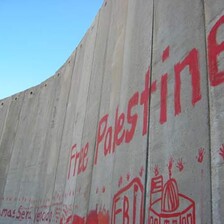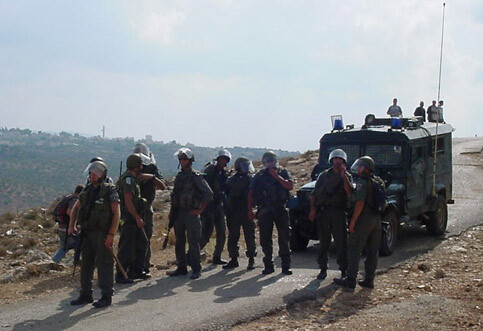
Israeli soldiers stand ready to confront villagers and activists at the weekly demonstration in the West Bank village of Bil’in
Coffee with Nir in Tel Aviv, Tuesday 24 October 2006
Today in Tel Aviv I am meeting with Nir Shalev for the first time in person. We’ve been e-mailing each other for three years now, but have never met. Because of various time constraints, I haven’t been able get to where he’s at during my last two trips to Palestine and Israel in spite of my best intentions. That’s why our meeting is first on my agenda this time.
Nir meets me downstairs at my hotel, and we go for coffee on Ben Yehuda Street. He explains his upbringing. His mother was born in Israel/Palestine of eastern European ancestry. His father was born in Poland, and immigrated to Palestine just before World War II when he was young boy, just in time to escape the Nazis.
Nir was born here a year before Israel conquered and occupied the West Bank, Gaza, the Golan Heights and the Sinai Peninsula during the 1967 Six-Day War. During Nir’s childhood, his father was a high ranking officer, and served as the military commander for the West Bank for two years in the mid 1970s. Although Nir’s father supported the agricultural settlements that Israel developed in the West Bank along the river frontier with Jordan for strategic reasons, he was against the other West Bank settlements, because he knew that they would cause more trouble than they were worth, and complicate efforts to forge a permanent peace with the Palestinians.
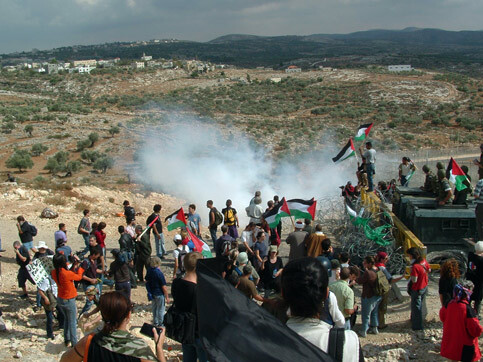
Israeli soldiers use tear gas against the non-violent demonstrators
Nir and I have this common heritage: we both grew up in military families. My father was a colonel in the United States Air Force, and an aeronautical engineer. He was a cold warrior during the age of Sputnik against the Soviets. When I was a pre-schooler, my dad worked in the development of Intercontinental Ballistic Missiles (ICBMs). When I was in primary school, we lived near Washington DC while my father worked at the Pentagon. I spent my early adolescence in Belgium while he worked for three years as part of the United States delegation to the North Atlantic Treaty Organization (NATO). Later on we moved to Seattle, Washington, where he worked for Boeing, developing the Air Launched Cruise Missile (ALCM). You can say that economically speaking, I am a product of the arms race! But in spite of this, my formative years in Europe shaped my current internationalist perspective, one that is not typical of your average American.
Similarly, Nir’s upbringing as the son of the West Bank commander gave him a humanitarian perspective that is not typical of your average Israeli. His father took him to meet with Palestinians, and from an early age, Nir was exposed to the humanity and hospitality of Palestinian Arab people which left an imprint upon him. He cannot accept the widespread demonization of Palestinians as “terrorists” that is so prevalent in Israeli and American popular culture today.
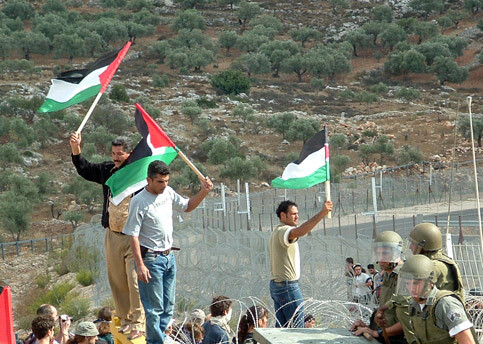
Over 50 percent of Bil’in’s lands are being effectively annexed by the barrier
Nir does not merely refute this demonization in theory; he tries to do something about it. He participates frequently in non-violent direct action in the Palestinian village called Bil’in against the apartheid separation wall, which is dividing this farming village from its agricultural lands for the benefit of another illegal Israeli settlement called Modi’in Illit. Nir participates in Bil’in as part of an organization known as Israeli Anarchists Against the Wall. Though not an anarchist himself, he admits that some of his colleagues are.
He has been coming to demonstrations in Bil’in since 2005. He has been arrested several times by the border patrol the Israeli army for acts of civil disobedience. A month ago, he was struck by the soldiers with batons, causing a fracture to his left forearm. His cast was just removed yesterday and he now wears a splint. His arm is still quite painful. In spite of this, he plans to again be in Bil’in this coming Friday for a big demonstration, and I plan to be there with him, along with Palestinians and other internationals together in solidarity with these villagers, who are having 50 percent of their agricultural land and livelihood stolen from them by the construction of this annexation barrier.
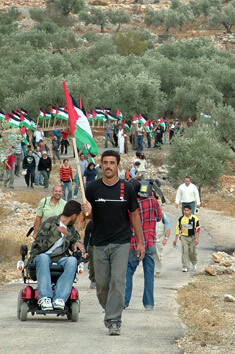
Marching toward the Annexation Barrier
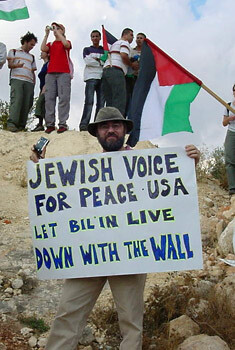
Boston pediatrician Dr. Allen Meyer, member of Jewish Voices for Peace
Friday, October 27, 2006 in the Palestinian Village of Bil’in
I travel from Ramallah in a group taxi with several activists affiliated with the International Solidarity Movement to the agricultural village of Bil’in. We are here with Israeli activists as well. All of the major Israeli peace and justice groups are with us today, along with prominent members of their leadership. Peace Now (Gush Shalom), Rabbis for Human Rights, Israeli Anarchists against the Wall, Israeli Committee Against House Demolitions, Ta’ayush and There is a Law (Yesh-Din). This latter group was formed to document violence that settlers commit against Palestinians so that they can be prosecuted. The hope is that the settlers can no longer commit violent crimes against local Palestinians without impunity. From the United States, there are also members from Jewish Voices for Peace; I become acquainted with a group of physicians from Boston who are a part of this group.
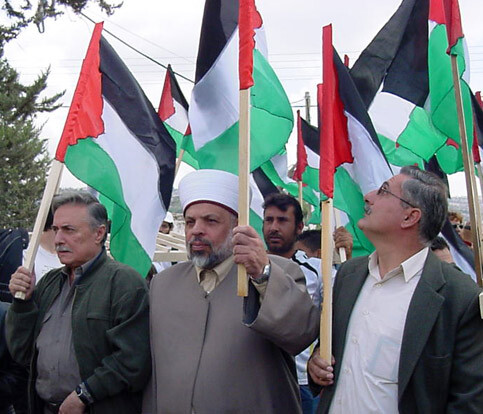
Qais Abu Laila, leader of the Democratic Front for the Liberation of Palestine (DFLP), Sheikh Tamimi, Mufti of Palestine, and Mohib Awad, Palestine Legislative Counsel (Fateh Member)
Since we arrive early, it is still easy to find Nir Shalev whom I met in Tel Aviv three days ago. He tells me that three bus loads of Israeli activists are en route from Tel Aviv and Jerusalem to be with us today. These activists play a cat-and-mouse game with the Israeli border patrol, who often try to impede their successful travel to this side of the annexation barrier which wreaks environmental havoc upon the land, and separates Palestinian farmers in Bil’in from their olive groves and their main source of income.
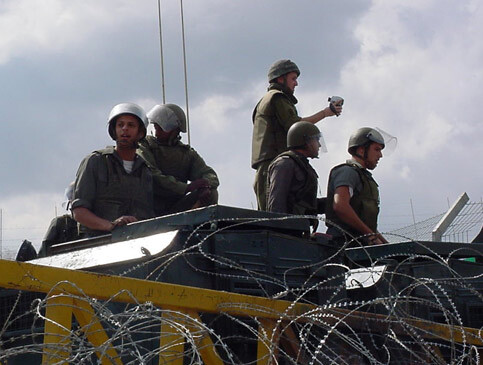
Israeli soldiers surveilling the demonstration at Bil’in
Israeli activists begin arriving in droves. Now there are also Germans, Japanese, Scandinavians, Spanish and other internationals gathering outside the mosque waiting for the Friday prayers to let out. As they emerge from prayer, Palestinians now fill into the international mix in solidarity with them; we are now 600 people strong, maybe more. We march toward the separation barrier, which looks like the old iron curtain, which used to divide the old Soviet empire from Western Europe. The international presence helps reduce the casualties among local Palestinians who are standing up for their rights. As we approach the barrier, about 100 Israeli army regulars fully equipped in riot gear are there to confront us.
They start launching sound grenades and tear gas. A tear gas canister lands quite close to me, and I get to experience its effects for my first time. My eyes start stinging and watering up, the skin on my forehead starts burning, and I explode into an uncontrollable coughing and salivating fit. I can only imagine what this would do to me if I had asthma. It might be fatal. Fortunately for me, the symptoms clear after about five minutes.
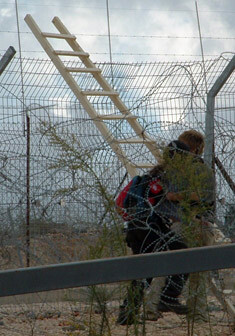
Activist put up a symbolic ladder to climb over the barrier
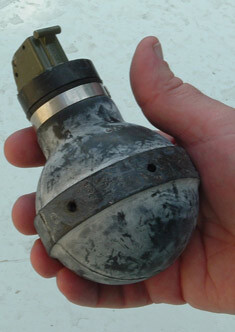
A spent teargas grenade
Palestinians use a large ladder to symbolically scale over the barrier toward their olive trees which have been their family’s livelihood for centuries, but they are beaten back. Several armored personnel vehicles (APVs) advance through the barrier. Two Israeli peace activists are beaten with batons and are arrested. A Swedish woman positions herself in front of one of the APVs in an attempt to impede its incursion into the village and she is beaten by border police with their batons, while others cling to her in an attempt to prevent her arrest. Israeli Occupation Forces jab their batons at the demonstrators and apply painful pressure point tactics in an attempt to pry them apart. The APVs continue into the village, firing tear gas canisters are fired into peoples’ homes.
Palestinian boys who are trying to defend the homes start throwing stones, or fire them off toward the soldiers using home made slingshots. The soldiers start firing at them with rubber bullets, and then live ammunition. A bullet ricochets off a rock and strikes a 12-year-old boy. He is transferred by ambulance to Ramallah hospital where he has exploratory surgery to extract shrapnel from his neck.
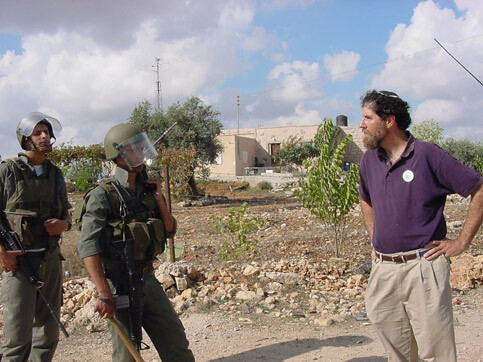
Rabbi Arik Aschermann of Rabbis for Human Rights confronting the IOF
These kinds of scenes have play themselves out every week in Bil’in without much attention from Israeli or American media. Sometimes people are permanently maimed or killed. But it is well covered by Arab media. When we get back to Ramallah, my friend Ziad tells me that his wife Monsoura saw me at the demonstration while watching Al-Jazeera.
There is now a growing awareness in the world which we hope will not allow the current Israeli regime to continue this kind of brute oppression indefinitely.
Related Links
Dr. Bill Dienst is a rural family and emergency room physician from Omak, Washington, USA.




